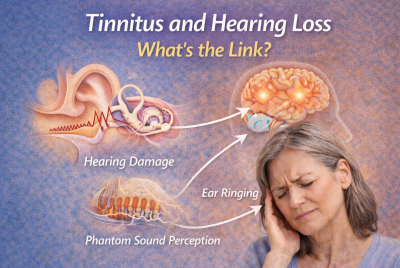Sugar Spikes Tinnitus Worse? How Blood Sugar Affects Ringing in the Ears
When Sweets Turn Into Buzzing
For many people, tinnitus means constant ringing, buzzing, or whooshing in the ears that never seems to stop. If you’ve ever noticed your symptoms flaring up after eating sweets, you’re not imagining it. Sugar spikes can make tinnitus worse by stressing your blood vessels, nerves, and inner ear function. In fact, more tinnitus sufferers are asking questions like: “Does sugar make tinnitus worse after sweets?” and “Can cutting sugar help reduce ear buzzing sound?” Let’s explore how blood sugar swings may be linked to your ear ringing—and what you can do about it.
How Sugar Spikes Make Tinnitus Worse
The Role of Blood Sugar in Ear Health
Your inner ear is extremely sensitive to changes in blood flow and nerve signaling. When you eat refined sugar or processed carbs, your blood sugar spikes quickly. This triggers insulin release, followed by a crash. These swings can:
-
Reduce circulation to the cochlea (the hearing organ in the inner ear).
-
Irritate the auditory nerves responsible for sound processing.
-
Increase inflammation that worsens ear ringing.
This is why many people notice tinnitus symptoms intensifying after desserts, soda, or sugary snacks.
Sugar, Nerve Stress, and Tinnitus
High sugar doesn’t just affect circulation—it also overloads the nervous system. For those already dealing with tinnitus, this can mean:
-
Sharper ringing or buzzing sounds after meals.
-
More frequent pulsatile tinnitus or whooshing in ears.
-
Difficulty sleeping due to nighttime ear ringing.
Chronic high sugar can also lead to nerve damage (neuropathy), which may play a role in long-term tinnitus progression.
Does Sugar Make Tinnitus Worse After Sweets?
Yes—many tinnitus sufferers report that eating sweets increases ringing intensity within hours. While not everyone reacts the same way, studies show that people with blood sugar sensitivity or prediabetes are more prone to hearing issues.
Think of it like this: when sugar rushes into your bloodstream, your ears and nerves feel the impact almost immediately.
How Blood Sugar Swings Affect Ringing in Ears
When your glucose levels swing up and down, it creates stress in three key ways:
-
Reduced circulation → less oxygen reaching the inner ear.
-
Oxidative stress → damaging inner ear hair cells.
-
Nerve irritation → amplifying the ringing sound.
This explains why some people find that dietary sugar and constant ear ringing go hand in hand.
Can Cutting Sugar Help Reduce Ear Buzzing Sound?
For many, the answer is yes. Cutting back on refined sugars and processed carbs may:
-
Reduce tinnitus flare-ups.
-
Improve energy and sleep quality.
-
Support overall ear and nerve health.
Some patients following a low-glycemic or diabetic-friendly diet notice significant relief as their blood sugar becomes more stable.
Tinnitus Remedies: Reducing Sugar Intake
Here are practical steps to reduce sugar’s impact on tinnitus:
-
🍎 Choose whole foods: Fruits, vegetables, whole grains, and lean proteins.
-
💧 Stay hydrated: Dehydration can intensify ear ringing.
-
🥗 Eat balanced meals: Pair carbs with protein and healthy fats to avoid spikes.
-
🚶 Exercise regularly: Helps regulate blood sugar naturally.
-
🍵 Replace soda with herbal tea or sparkling water.
Small daily changes can lead to noticeable improvement in tinnitus symptoms over time.
Diabetic Diet Tinnitus Relief: A Natural Treatment Approach
People with diabetes or insulin resistance often report worsening tinnitus symptoms during periods of poor glucose control. Adopting a diabetic-friendly diet can act as a form of natural tinnitus treatment.
Key tips:
-
Monitor blood sugar regularly.
-
Limit refined sugar, white bread, and sugary drinks.
-
Focus on high-fiber foods like beans, oats, and leafy greens.
-
Avoid skipping meals, which can cause glucose crashes.
Does High Sugar Trigger Pulsatile Tinnitus or Whooshing in Ears?
Yes. Pulsatile tinnitus—a rhythmic whooshing sound often linked to circulation—can worsen after sugar spikes. Elevated glucose stresses blood vessels, causing irregular blood flow that the ear may pick up as pulsing or whooshing.
If you notice this symptom often, it may be a sign of vascular or metabolic issues and should be evaluated by a doctor.
Best Foods to Avoid: Sugar and Tinnitus Prevention Tips
Your daily diet plays a huge role in how often you experience ear buzzing sound flare-ups. While sugar spikes can make tinnitus worse, the right foods can support hearing health and keep ringing in ears more manageable.
❌ Foods to Limit or Avoid (Triggering Tinnitus Flare-Ups)
-
Refined Sugars & Sweets – Candy, cakes, and sodas can cause blood sugar spikes, worsening high-pitched ear noise.
-
Processed Carbs – White bread, pastries, and pasta create the same glucose swings that make tinnitus after loud noise harder to manage.
-
Sugary Drinks & Alcohol – Energy drinks, sweetened coffee, and cocktails can dehydrate the body and increase whooshing in ears.
-
Fried & Processed Foods – These are inflammatory and may amplify constant ear ringing over time.
✅ Best Foods for Tinnitus Relief (Supporting Ear & Nerve Health)
-
Fresh Vegetables – Spinach, kale, broccoli, and carrots provide antioxidants and magnesium that promote inner ear circulation.
-
Low-Glycemic Fruits – Berries, apples, and cherries satisfy sweet cravings without the sugar surge that fuels ear buzzing sound.
-
Whole Grains – Oats, quinoa, and brown rice keep blood sugar steady and energy levels balanced.
-
Lean Proteins – Salmon, chicken, turkey, beans, and eggs repair nerves and aid hearing function.
-
Healthy Fats – Avocados, walnuts, flaxseeds, and olive oil reduce inflammation linked to ear ringing at night.
-
Magnesium-Rich Foods – Pumpkin seeds, almonds, and spinach relax blood vessels and may calm pulsatile tinnitus.
-
Hydration-Friendly Drinks – Water, green tea, and herbal teas improve circulation and reduce tinnitus remedies dependency.
👉 By avoiding sugar-heavy foods and choosing nutrient-rich meals, you can take a powerful step toward natural tinnitus treatment and long-term relief.
Sample 1-Day Tinnitus-Friendly Meal Plan
Breakfast: Balanced Start
-
2 scrambled eggs with spinach and mushrooms (protein + veggies)
-
1 slice of whole-grain toast with avocado (healthy fats + fiber)
-
Unsweetened green tea or water
💡 Why it helps: The protein + healthy fats combination prevents a mid-morning sugar crash, keeping tinnitus stable.
Morning Snack: Smart Energy Boost
-
A small handful of unsalted almonds or walnuts
-
1 small apple
💡 Why it helps: Nuts add magnesium, which supports nerve health, while the apple gives natural sweetness without spiking blood sugar.
Lunch: Blood Sugar-Friendly Bowl
-
Grilled salmon or chicken
-
Quinoa or brown rice (small portion)
-
Steamed broccoli, carrots, and zucchini
-
Olive oil drizzle + lemon juice for flavor
💡 Why it helps: Balanced meal with lean protein, complex carbs, and fiber—all of which reduce post-meal glucose spikes that can worsen ear buzzing.
Afternoon Snack: Calm & Steady
-
Plain Greek yogurt (unsweetened) with a few blueberries
-
Sprinkle of chia seeds
💡 Why it helps: Yogurt offers probiotics for gut health, while chia seeds stabilize energy and may reduce inflammation linked to tinnitus.
Dinner: Light & Anti-Inflammatory
-
Baked turkey or tofu with herbs
-
Steamed asparagus and roasted sweet potato (moderate carb)
-
Side salad with leafy greens, cucumbers, and olive oil vinaigrette
💡 Why it helps: Sweet potato provides slow-release carbs, while leafy greens help circulation, reducing pressure that can worsen ringing in ears.
Evening Wind-Down
-
Herbal tea (chamomile, ginger, or peppermint)
-
If hungry: a few celery sticks with hummus
💡 Why it helps: Herbal teas promote relaxation, better sleep, and less nighttime tinnitus flare-ups.
👉 This meal plan is low in refined sugar, high in fiber, protein, magnesium, and antioxidants—all linked to reduced tinnitus aggravation.
Lifestyle Tips to Reduce Sugar’s Impact on Tinnitus
Living with tinnitus can be stressful enough without diet making it worse. The good news is that small lifestyle adjustments can help stabilize your blood sugar and reduce ear ringing flare-ups. Here are strategies worth trying:
1. Practice Smart Meal Timing
Skipping meals can cause blood sugar to crash, which may intensify tinnitus. Aim to eat smaller, balanced meals every 3–4 hours. This keeps glucose stable and reduces nervous system stress.
2. Balance Carbs with Protein and Healthy Fats
Instead of eating sweets alone, pair carbs with protein (chicken, beans, eggs) and healthy fats (avocado, nuts, olive oil). This slows sugar absorption and prevents rapid spikes that trigger ear buzzing.
3. Stay Hydrated
Dehydration worsens both tinnitus and blood sugar control. Keep a water bottle nearby and aim for 8–10 cups per day. Herbal teas like chamomile or ginger can calm both digestion and nerves.
4. Move Your Body Daily
Exercise is one of the best natural remedies for blood sugar regulation. Even a 20-minute walk after meals can help reduce glucose spikes and improve circulation to the inner ear.
5. Improve Sleep Quality
Poor sleep raises stress hormones and disrupts glucose control. Create a bedtime routine: limit screens, keep your bedroom cool and dark, and avoid caffeine or sweets before bed to reduce nighttime ear ringing.
6. Manage Stress Levels
Stress and tinnitus feed off each other. Try deep breathing, yoga, or meditation apps to calm your nervous system. Less stress means more stable blood sugar—and fewer flare-ups.
7. Rethink Drinks
Liquid sugars like soda, energy drinks, and sweetened coffee can trigger rapid spikes. Switch to sparkling water, black coffee, or unsweetened iced tea to keep blood sugar and tinnitus under control.
8. Watch Alcohol Intake
Alcohol can raise or crash blood sugar, depending on the type and amount. If you notice louder ringing after drinking, limit intake and choose lower-sugar options like dry wine or light beer.
9. Keep a Food & Tinnitus Journal
Everyone’s triggers are different. Track meals, snacks, and drinks alongside tinnitus severity. Over time, you’ll spot which foods cause ear ringing spikes and which keep symptoms calm.
👉 Together, these lifestyle tips give you better control over sugar’s impact, reduce tinnitus flare-ups, and support long-term hearing health.
-
🍽️ Eat smaller meals throughout the day to avoid large sugar swings.
-
🛌 Get enough sleep—poor rest can worsen both sugar control and ear ringing.
-
🧘 Manage stress with meditation, yoga, or deep breathing.
-
🚭 Avoid nicotine, which reduces circulation and worsens tinnitus.
-
☕ Limit caffeine and alcohol, which may trigger spikes or crashes.
When to See a Doctor
While diet changes help many, you should see a doctor if:
-
Your tinnitus becomes constant or suddenly worsens.
-
You develop pulsatile tinnitus (whooshing sound in rhythm with your heartbeat).
-
You have diabetes and notice worsening ear symptoms.
-
Your tinnitus is accompanied by dizziness, hearing loss, or ear pain.
A healthcare professional can rule out underlying conditions, check your blood sugar control, and recommend treatments such as hearing aids, sound therapy, or medications if needed.
FAQs Related to Sugar Spikes Tinnitus Worse
1. Does sugar really make tinnitus worse?
Yes, sugar spikes can make tinnitus worse by disrupting blood flow, irritating nerves, and increasing inflammation. Many people report more intense ringing in the ears after consuming sweets, soda, or processed carbs.
2. Can diabetes cause tinnitus or ear ringing?
Diabetes can contribute to tinnitus by damaging small blood vessels and nerves in the inner ear. Poorly controlled blood sugar increases the risk of constant ear ringing and hearing loss.
3. How quickly does sugar affect tinnitus symptoms?
Some people notice changes within a few hours of eating sweets. Spikes can cause sharper buzzing or ringing, while crashes may worsen fatigue and stress, which can intensify tinnitus.
4. What foods should I avoid to reduce tinnitus flare-ups?
Avoid soda, candy, baked goods, white bread, and processed snacks. These foods cause rapid blood sugar swings that may worsen tinnitus. Instead, focus on whole grains, lean proteins, and low-glycemic fruits.
5. Can cutting sugar completely cure tinnitus?
Cutting sugar may not cure tinnitus entirely, but it can significantly reduce flare-ups, especially in people sensitive to blood sugar changes. When combined with sound therapy, stress management, and hearing support, it may provide lasting relief.
Conclusion: Sugar Spikes Tinnitus Worse
Taking Control of Sugar and Tinnitus
If you’ve ever wondered why your ear ringing feels worse after sweets, the answer may lie in your blood sugar. By stabilizing glucose levels, avoiding processed sugar, and adopting a tinnitus-friendly diet, you can reduce flare-ups and take control of your symptoms.
Remember—small steps like choosing water over soda or snacking on nuts instead of candy can make a real difference for your ears and overall health.
Disclaimer
This article is for informational purposes only and does not replace professional medical advice. Always consult a qualified healthcare provider before making dietary changes, starting supplements, or seeking treatment for tinnitus or related conditions.

- Neck Pain Tinnitus Cause
- Why Does My Ear Ring Only When Lying Down
- Vitamin B12 Deficiency Tinnitus Relief






